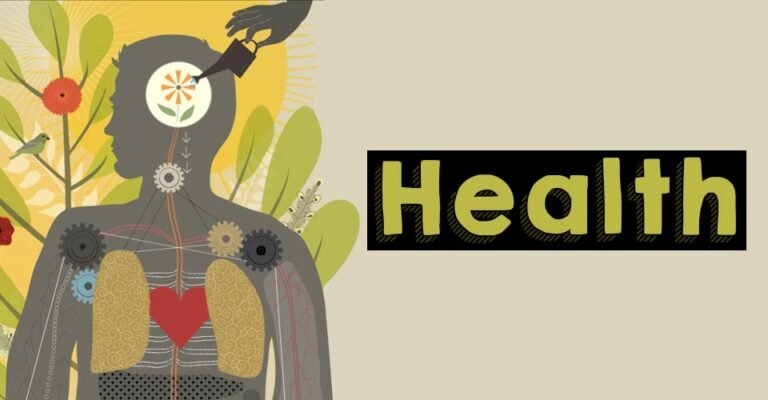Health is one of the most important aspects of our lives, but also one of the most complex and challenging.
Many factors affect our health, from genetics and lifestyle to environment and diseases. That’s why many people have frequently asked questions about health, wellness, fitness, and health insurance, and also want to learn more about how to improve their well-being.
This article answers 50+ questions about health that cover various topics. Whether you are looking for general advice or specific information, you will find something useful and interesting in this comprehensive guide.
Table of contents
- What is Health?
- Questions About Health and Wellness
- Questions About Health and Fitness
- Frequently Asked Questions About Health Care
- Questions About Health Disparities
- Frequently Asked Questions About Health Insurance
- Research Questions About Health with their Answers
- Pet Questions About Health
- Trivia Questions and Answers About Health
- FAQs
- Conclusion
- References
- Recommendations
What is Health?
Health is a complex and multifaceted concept that has been defined in various ways by different disciplines, perspectives, and organizations. One of the most widely used and influential definitions of health is the one proposed by the WHO in its constitution: “Health is a state of complete physical, mental, and social well-being and not merely the absence of disease or infirmity.”
This definition implies that health is not just a binary condition of being sick or healthy, but a dynamic and holistic state that encompasses the physical, mental, and social aspects of human life.
It also recognizes that health is a fundamental human right that should be enjoyed by everyone regardless of their race, religion, political belief, economic or social condition. Moreover, it acknowledges that health is influenced by a range of factors, such as the environment, the health system, individual behavior, and the social determinants of health.
However, this definition has also been criticized for being too broad, vague, and idealistic, as it does not specify the criteria or indicators for measuring health or well-being, nor does it account for the diversity and complexity of human experiences and values.
Some have argued that health should be defined more narrowly and objectively, based on scientific evidence and measurable outcomes, such as the absence of disease, the presence of functioning, or the quality of life.
See also: Qualitative vs Quantitative Survey Questions | Top 30 Questions to Ask
Questions About Health and Wellness
Question 1: What is the importance of regular exercise in maintaining overall health and wellness?
Regular exercise is crucial for maintaining a healthy lifestyle as it enhances cardiovascular health, boosts mood through the release of endorphins, and helps control weight by burning calories.
Question 2: How can one achieve a balanced and nutritious diet?
A balanced diet includes a variety of fruits, vegetables, lean proteins, whole grains, and healthy fats. Portion control and mindful eating also play key roles in achieving nutritional balance.
Question 3: Why is mental health an integral part of overall well-being?
Mental health influences the emotional, psychological, and social aspects of our lives. Prioritizing mental health through stress management, mindfulness, and seeking support when needed contributes to overall wellness.
Question 4: What role does sleep play in maintaining good health?
Adequate and quality sleep is essential for physical and mental recovery. It supports immune function, cognitive performance, and emotional well-being.
Question 5: How does hydration impact health and wellness?
Staying hydrated is vital for bodily functions, including digestion, temperature regulation, and nutrient transportation. It also helps maintain skin health and energy levels.
Question 6: What are the potential benefits of stress management techniques?
Effective stress management, such as meditation, exercise, or deep breathing, can reduce the negative impact of stress on both physical and mental health.
Question 7: What are the risks associated with excessive alcohol and tobacco consumption?
Excessive alcohol and tobacco use can lead to various health issues, including cardiovascular diseases, respiratory problems, and an increased risk of certain cancers.
See also: 70+ Event Survey Questions You Must Ask to Achieve Success.
Questions About Health and Fitness
Question 1: Why is physical fitness important for overall health?
Physical fitness enhances cardiovascular health, strengthens muscles and bones, and improves mental well-being by releasing endorphins. It contributes to a holistic sense of wellness.
Question 2: What constitutes a well-rounded fitness routine?
A balanced fitness routine includes cardiovascular exercises, strength training, flexibility exercises, and activities promoting balance. This combination targets different aspects of physical health.
Question 3: How can one establish realistic fitness goals?
Setting achievable and measurable goals based on individual abilities and preferences is crucial. Gradual progress and consistency lead to sustainable results.
Question 4: How can individuals stay motivated to exercise regularly?
Finding enjoyable activities, setting realistic goals, and incorporating variety into the routine can help maintain motivation. Having a workout buddy or joining group classes can also provide accountability.
Question 5: What role does hydration play in fitness?
Proper hydration is vital for performance, as it regulates body temperature, transports nutrients, and supports muscle function. Dehydration can negatively impact endurance and recovery.
Question 6: What are the benefits of incorporating rest days into a fitness routine?
Rest days allow the body to recover, reducing the risk of injury and preventing burnout. Adequate rest is essential for muscle repair and overall well-being.
Question 7: How can individuals overcome common barriers to regular exercise?
Identifying and addressing obstacles such as time constraints, lack of motivation, or physical limitations is key. Creating a flexible and enjoyable routine increases adherence.
Question 8: What are the potential risks of overtraining?
Overtraining can lead to fatigue, decreased performance, and an increased risk of injuries. Balancing intensity, duration, and rest is essential for a sustainable fitness regimen.
See also: 100+ Product Survey Questions to Improve Customer Experience With Sample Questionnaire
Frequently Asked Questions About Health Care
Question 1: Why is access to healthcare important for individuals and communities?
Access to healthcare ensures timely diagnosis, treatment, and preventive measures, contributing to overall well-being and reducing the burden of diseases on society.
Question 2: How can individuals navigate the complexities of health insurance?
Understanding health insurance policies involves reviewing coverage details, deductibles, and copayments. Utilizing insurance resources and seeking assistance from professionals can clarify any uncertainties.
Question 3: Why is preventive care crucial in the realm of healthcare?
Preventive care, including vaccinations and regular check-ups, detects potential health issues early, promoting a proactive approach to maintaining health and reducing long-term healthcare costs.
Question 4: How can patients effectively communicate with healthcare providers?
Clear communication involves sharing concerns, asking questions, and actively participating in healthcare decisions. Building a collaborative relationship with healthcare professionals enhances the quality of care.
Question 5: What are the key components of a healthy lifestyle that can reduce the need for medical interventions?
Maintaining a balanced diet, engaging in regular physical activity, managing stress, and avoiding tobacco and excessive alcohol use are foundational elements of a healthy lifestyle that can prevent many health issues.
Question 6: What is the significance of mental health in overall healthcare?
Mental health is inseparable from physical health. Addressing mental health concerns, such as anxiety or depression, is crucial for a holistic approach to healthcare.
Question 7: How does cultural competence contribute to better healthcare outcomes?
Cultural competence in healthcare involves understanding diverse backgrounds and tailoring care accordingly. It promotes trust, effective communication, and improved patient outcomes.
See also: 70+ Brand Perception Survey Questions With Sample Template
Questions About Health Disparities
Question 1: What are health disparities, and why do they exist?
Health disparities refer to systematic, avoidable differences in health outcomes that exist among different populations. They result from social, economic, and environmental inequalities, leading to unequal access to healthcare resources.
Question 2: How do socioeconomic factors contribute to health disparities?
Socioeconomic factors, including income, education, and employment, influence access to healthcare, nutrition, and living conditions. Disparities in these factors contribute significantly to health inequalities.
Question 3: Why is there a need for a focus on cultural competence in healthcare?
Cultural competence ensures healthcare providers understand and respect diverse backgrounds, improving communication and trust. It is essential for addressing health disparities and delivering equitable care.
Question 4: How does geography impact health disparities?
Geographic location can affect access to healthcare services, quality of education, and exposure to environmental hazards. Rural and underserved urban areas often face more significant health disparities.
Question 5: What role does systemic racism play in health disparities?
Systemic racism contributes to unequal opportunities, discrimination, and limited access to resources, resulting in poorer health outcomes for marginalized communities.
Question 6: What strategies can communities employ to address local health disparities?
Community-driven initiatives, education programs, and advocacy efforts can empower communities to address local health disparities, promoting positive health outcomes.
Question 7: How can technology be leveraged to bridge health disparities?
Technology can improve healthcare access through telemedicine, health apps, and data analytics. Ensuring equitable access to these tools helps bridge gaps in healthcare delivery.
See also: 70+ Must Ask Exit Survey Questions For a Successful Exit Interview
Frequently Asked Questions About Health Insurance
Question 1: Why is health insurance important?
Health insurance provides financial protection by covering medical expenses, ensuring individuals can access necessary healthcare without facing exorbitant costs.
Question 2: What does health insurance typically cover?
Health insurance plans vary, but they often cover hospital stays, doctor visits, prescription medications, preventive care, and certain medical procedures. Specific coverage details depend on the plan.
Question 3: How do I choose the right health insurance plan for me?
Consider factors such as your health needs, budget, preferred doctors and hospitals, and the plan’s coverage network. Compare plans to find one that aligns with your specific requirements.
Question 4: What is a deductible, and how does it work?
A deductible is the amount you must pay out-of-pocket before your insurance starts covering expenses. Higher deductibles often result in lower monthly premiums, and vice versa.
Question 5: How can I lower my health insurance costs?
Opting for a higher deductible, maintaining a healthy lifestyle, and taking advantage of employer-sponsored plans or government subsidies can help reduce health insurance costs.
Question 6: Can I keep my current doctor with any health insurance plan?
Check if your preferred healthcare providers are in the network of the health insurance plan you’re considering. In-network providers typically cost less than out-of-network ones.
Question 7: What happens if I lose my job and employer-sponsored health insurance?
If you lose job-based health insurance, you may be eligible for a Special Enrollment Period through the Health Insurance Marketplace. Additionally, you can explore options like COBRA or Medicaid, depending on your circumstances.
See also: 50+ Workshop Survey Questions with Sample Evaluation Form
Research Questions About Health with their Answers
Question 1: What are the key determinants of health disparities, and how can they be effectively addressed?
Understanding the social, economic, and environmental factors contributing to health disparities is essential. Interventions should focus on promoting health equity through targeted policies and community-based initiatives.
Question 2: What are the long-term effects of emerging technologies, such as artificial intelligence, on healthcare delivery and patient outcomes?
Examining the ethical implications, privacy concerns, and potential benefits of AI in healthcare can guide responsible integration and maximize positive impacts on patient care.
Question 3: How can mental health interventions be tailored to diverse cultural contexts for improved effectiveness?
Research should explore culturally sensitive approaches to mental health, considering diverse belief systems, stigma reduction, and community-based support systems to enhance the success of interventions.
Question 4: What role do social determinants of health play in shaping health outcomes, and how can healthcare systems address these factors?
Investigating the impact of social determinants, such as housing, education, and employment, on health outcomes can inform policies and interventions to reduce disparities and promote health equity.
Question 5: What are the most effective strategies for promoting healthy behaviors and lifestyle changes at the population level?
Research should focus on evidence-based interventions, community engagement, and policy initiatives to encourage and sustain healthy behaviors, ultimately preventing chronic diseases.
See also: 200+ Church Survey Questions to Ask Congregations | Sample Questionnaire
Pet Questions About Health
Question 1: How often should I take my pet to the veterinarian for check-ups?
Regular veterinary check-ups are crucial for pets. Typically, an annual visit is recommended for vaccinations, dental exams, and overall health assessments. However, older pets or those with specific health issues may require more frequent visits.
Question 2: What is the importance of proper nutrition for pets?
Proper nutrition is vital for pets to maintain overall health, energy levels, and a healthy weight. It helps prevent issues like obesity, supports strong immunity, and contributes to a shiny coat and healthy skin.
Question 3: How can I ensure my pet gets enough exercise?
The amount of exercise varies based on the pet’s breed, age, and health. Dogs, for instance, often require daily walks and playtime. Cats benefit from interactive toys. Tailoring activities to your pet’s needs ensures they stay physically and mentally stimulated.
Question 4: What signs should I watch for to identify potential health problems in my pet?
Pay attention to changes in behavior, appetite, water consumption, bathroom habits, and physical appearance. Lethargy, excessive scratching, or changes in weight can be indicative of underlying health issues, warranting a veterinary visit.
Question 5: How can I maintain my pet’s dental health?
Dental care is crucial for pets to prevent issues like gum disease and tooth decay. Regular tooth brushing, dental treats, and chew toys designed for dental health can help keep your pet’s teeth clean. Professional dental cleanings may also be recommended by your veterinarian.
Questions About Health for Students
Question 1: How does a healthy lifestyle impact student academic performance?
Maintaining good nutrition, regular exercise, and sufficient sleep positively influence cognitive function, concentration, and overall academic success.
Question 2: What are effective strategies for managing stress during the school year?
Students can adopt stress-management techniques such as time management, mindfulness, and seeking support to enhance mental well-being and academic resilience.
Question 3: Why is sleep crucial for student health?
Sufficient sleep is essential for memory consolidation, mood regulation, and overall cognitive function, directly impacting a student’s ability to learn and perform well academically.
Question 4: How can students balance a busy academic schedule with a healthy lifestyle?
Prioritizing time for healthy meals, exercise, and self-care fosters a balanced lifestyle, contributing to sustained academic performance.
Question 5: What resources are available on campus to support student health and well-being?
Students can explore on-campus health services, counseling centers, and wellness programs to access resources and support for physical and mental well-being during their academic journey.
Pageant Questions About Health
Question 1: How do pageant contestants maintain their physical health and fitness during competition preparation?
Contestants prioritize a balanced diet, regular exercise, and wellness routines to ensure they are physically fit, energized, and confident on stage.
Question 2: Why is mental health important for pageant participants, and how do they address it?
Mental well-being is crucial, and contestants often engage in mindfulness practices, seek support networks, and promote positive self-talk to enhance their mental resilience.
Question 3: How can pageant platforms be utilized to advocate for specific health causes or initiatives?
Pageant winners often leverage their influence to raise awareness for health-related issues, partnering with organizations to champion specific causes and drive positive change.
Question 4: What role does self-care play in a pageant contestant’s overall health and performance?
Self-care rituals, including adequate rest, skin care, and relaxation techniques, contribute to a contestant’s overall well-being and radiance during the competition.
Question 5: How can pageants contribute to promoting a holistic approach to health and beauty standards?
Pageants have the potential to redefine beauty standards by emphasizing inner confidence, intelligence, and a commitment to health, fostering a positive impact on both contestant’s and society’s perception of beauty.
Dog Questions About Health
Question 1: How often should I take my dog for veterinary check-ups?
Regular veterinary visits, ideally once a year, are essential for preventive care, vaccinations, and early detection of potential health issues in dogs.
Question 2: What signs indicate that my dog may be unwell?
Pay attention to changes in behavior, appetite, energy levels, or unusual symptoms like limping. Any noticeable changes should prompt a visit to the veterinarian.
Question 3: How can I maintain my dog’s dental health?
Regular tooth brushing, dental chews, and professional cleanings when necessary contribute to preventing dental issues and maintaining overall oral health in dogs.
Question 4: What is a proper diet for my dog’s health and nutrition?
Providing a balanced and nutritious diet suitable for your dog’s age, size, and breed is crucial for their overall health, energy levels, and longevity.
Question 5: How much exercise does my dog need for optimal health?
The amount of exercise varies by breed and size. Daily walks, playtime, and mental stimulation are essential for keeping dogs physically and mentally healthy.
Tarot Questions About Health
Question 1: How can tarot be used to gain insights into one’s overall well-being?
Tarot cards can offer symbolic representations that help individuals explore their mental, emotional, and physical states, providing a holistic perspective on health.
Question 2: What cards in a tarot deck may symbolize health and vitality?
Cards like The Sun, The Empress, and The World often signify positive energy, growth, and overall well-being, offering encouragement in health-related inquiries.
Question 3: How can tarot help identify sources of stress affecting health?
Tarot readings can unveil underlying issues causing stress, offering insights that empower individuals to address and alleviate sources of mental and emotional strain.
Question 4: Can tarot predict specific health outcomes?
The tarot is not designed for predictive health readings. Instead, it can guide lifestyle choices, potential obstacles, and the importance of self-care.
Question 5: How often should someone seek health-related insights through tarot readings?
Tarot readings for health can be occasional tools for reflection. It’s recommended to approach them with an open mind, using them as supportive guidance rather than absolute predictions.
Trivia Questions and Answers About Health
- What is the body’s largest organ? Skin.
- What is the recommended daily water intake for adults? Approximately 8 cups (64 ounces) or more, depending on factors like activity level and climate.
- Which vitamin is produced when the skin is exposed to sunlight? Vitamin D.
- What percentage of the human body is water? Approximately 60%.
- What is the powerhouse of the cell? Mitochondria.
- How many bones are there in the adult human body? 206.
- What is the normal resting heart rate for adults? 60-100 beats per minute.
- What is the main function of red blood cells? Transporting oxygen to body tissues.
- Which organ produces insulin? Pancreas.
- What is the average body temperature in degrees Celsius? 37 degrees Celsius (98.6 degrees Fahrenheit).
- What nutrient is primarily responsible for building and repairing body tissues? Protein.
- How many taste buds does the average human tongue have? Around 10,000.
- What is the largest part of the brain? Cerebrum.
- Which mineral is essential for strong and healthy bones? Calcium.
- What is the function of the respiratory system? To facilitate the exchange of oxygen and carbon dioxide in the body.
- Which organ filters and detoxifies blood? Liver.
- What is the recommended daily intake of fruits and vegetables for adults? 5 servings.
- Which gas do plants absorb during photosynthesis? Carbon dioxide.
- What is the smallest bone in the human body? Stapes, located in the middle ear.
- What is the term for the body’s ability to resist an infectious disease? Immunity.
See also: 100+ Frequently Asked Questions About Social Media with Answers
FAQs
Unfortunately, millions of Americans live with chronic conditions like heart disease, diabetes, and cancer.
The World Health Organization (WHO) defines health as the balance of mental, physical, and social health, also known as the health triangle. Having a good balance in all three areas is essential to living a healthy lifestyle.
Health is a state of complete physical, mental, and social well-being and not merely the absence of disease or infirmity. The enjoyment of the highest attainable standard of health is one of the fundamental rights of every human being without distinction of race, religion, political belief, economic or social condition.
Being ill is not nice. Being healthy is better. The main principles of health are a healthy diet, no drugs (alcohol, smoking, drugs, eating too much), regular exercise, adequate rest, and positive thinking.
Health is a resource for everyday life, not the objective of living; it is a positive concept, emphasizing social and personal resources, as well as physical capacities.” Thus, health refers to the ability to maintain homeostasis and recover from adverse events.
Conclusion
Health is a dynamic and multifaceted concept that requires constant attention and care. By being informed and proactive, you can make better choices for yourself and your loved ones.
This is why we have provided you with the most frequently asked questions about health, wellness, fitness, and health insurance.
Remember that the best source of health information is always a qualified professional who can assess your situation and needs.
References
- Britannica.com – 17 Questions About Health and Wellness Answered
- Aarp.org – Your 50 Top Health Questions Answered
Recommendations
- 250+ Best Animal Trivia for Kids Questions and Answers (Easiest to Hardest)
- 250+ Best Hocus Pocus Trivia Questions and Answers (Easiest to Hardest)
- 35+ Post-Webinar Survey Questions You Must Ask for Quality Feedback
- 250+ Best Dog Trivia Questions and Answers (Easiest to Hardest)
- 250+ Best Minecraft Trivia Questions and Answers (Easiest to Hardest)
- 50 Frequently Asked Questions About Time Travel with Answers
- 100+ Frequently Asked Questions About Immigration with Answers





